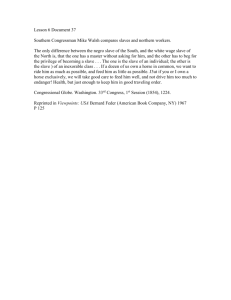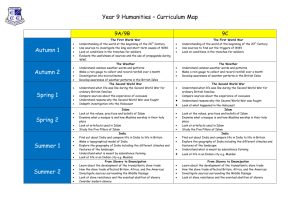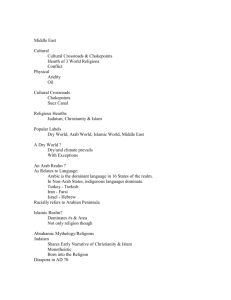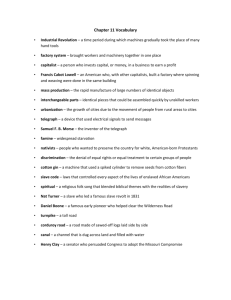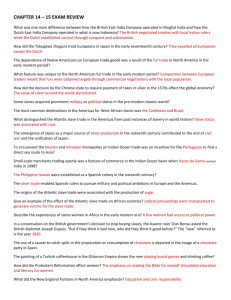Regional Outline for: Sub
advertisement
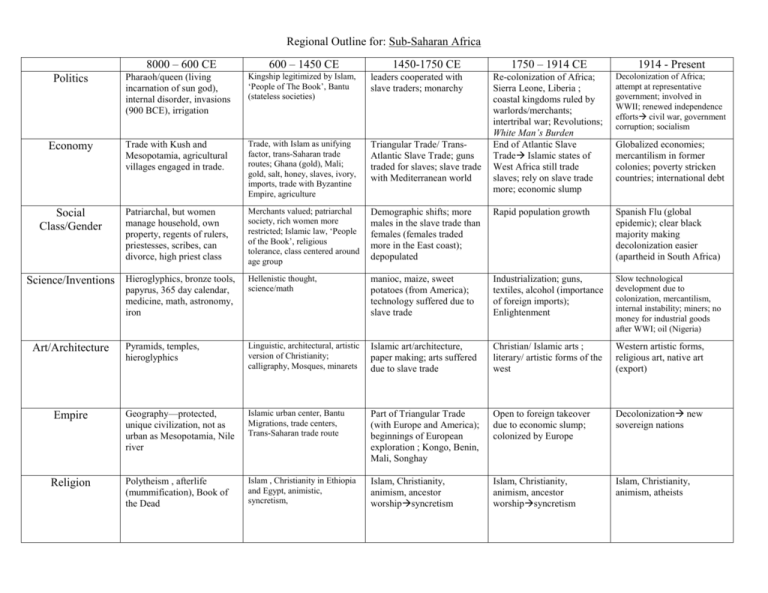
Regional Outline for: Sub-Saharan Africa 8000 – 600 CE 600 – 1450 CE 1750 – 1914 CE 1914 - Present Re-colonization of Africa; Sierra Leone, Liberia ; coastal kingdoms ruled by warlords/merchants; intertribal war; Revolutions; White Man’s Burden End of Atlantic Slave Trade Islamic states of West Africa still trade slaves; rely on slave trade more; economic slump Decolonization of Africa; attempt at representative government; involved in WWII; renewed independence efforts civil war, government corruption; socialism Demographic shifts; more males in the slave trade than females (females traded more in the East coast); depopulated Rapid population growth Spanish Flu (global epidemic); clear black majority making decolonization easier (apartheid in South Africa) Hellenistic thought, science/math manioc, maize, sweet potatoes (from America); technology suffered due to slave trade Industrialization; guns, textiles, alcohol (importance of foreign imports); Enlightenment Slow technological development due to colonization, mercantilism, internal instability; miners; no money for industrial goods after WWI; oil (Nigeria) Pyramids, temples, hieroglyphics Linguistic, architectural, artistic version of Christianity; calligraphy, Mosques, minarets Islamic art/architecture, paper making; arts suffered due to slave trade Christian/ Islamic arts ; literary/ artistic forms of the west Western artistic forms, religious art, native art (export) Geography—protected, unique civilization, not as urban as Mesopotamia, Nile river Islamic urban center, Bantu Migrations, trade centers, Trans-Saharan trade route Part of Triangular Trade (with Europe and America); beginnings of European exploration ; Kongo, Benin, Mali, Songhay Open to foreign takeover due to economic slump; colonized by Europe Decolonization new sovereign nations Polytheism , afterlife (mummification), Book of the Dead Islam , Christianity in Ethiopia and Egypt, animistic, syncretism, Islam, Christianity, animism, ancestor worshipsyncretism Islam, Christianity, animism, ancestor worshipsyncretism Islam, Christianity, animism, atheists 1450-1750 CE Politics Pharaoh/queen (living incarnation of sun god), internal disorder, invasions (900 BCE), irrigation Kingship legitimized by Islam, ‘People of The Book’, Bantu (stateless societies) leaders cooperated with slave traders; monarchy Economy Trade with Kush and Mesopotamia, agricultural villages engaged in trade. Trade, with Islam as unifying factor, trans-Saharan trade routes; Ghana (gold), Mali; gold, salt, honey, slaves, ivory, imports, trade with Byzantine Empire, agriculture Triangular Trade/ TransAtlantic Slave Trade; guns traded for slaves; slave trade with Mediterranean world Social Class/Gender Patriarchal, but women manage household, own property, regents of rulers, priestesses, scribes, can divorce, high priest class Merchants valued; patriarchal society, rich women more restricted; Islamic law, ‘People of the Book’, religious tolerance, class centered around age group Science/Inventions Hieroglyphics, bronze tools, papyrus, 365 day calendar, medicine, math, astronomy, iron Art/Architecture Empire Religion Globalized economies; mercantilism in former colonies; poverty stricken countries; international debt

